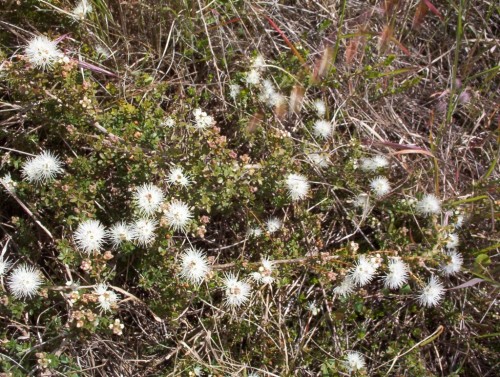Front Line Coastal Plants
Do I make an assumption that coastal plants receive more rainfall and therefore I could plant species that do not have to be so drought tolerant? It is a nice thought. I was looking through an older reference book that I have and came accross some more lists of plants.
Australian Native Plants For Full Coastal Exposure
Shrubs
Leucophyta brownii (Cushion Bush)
Banksia serrata
Calothamnus homolophyllus
Calothamnus quadrifidus
Hibbertia scandens
Isolepis nodosa
Pimelia ferruginea
Senecio lautus ssp. maritimus
Thomasia petalocalyx
Australian Native Plants for Seaside Gardens
This is the beginning of my list of plants suitable for seaside plantings. It is a good idea to use hedges or fences as wind breaks against the prevailing sea winds so that more tender plants can be planted on the lee side where they are less likely to be burnt by salt laden winds. Not having experience with this type of locality I am writing from observation, discussions with folk who do garden in this type of area and what I read.
I am choosing plants that are known to be also lime tolerant. My list also reflects drought tolerance. I will also have to do a list for those who do not need to worry about these other aspects.
Australian Native Plants for Seaside Gardens.
Shrubs
Acacia sophorae
Alyogyne hakiefolia
Banksia grandis
Banksia media
Banksia speciosa
Banksia spinulosa
Chamelaucium uncinatum
Correa alba
Correa backhousiana
Correa reflexa
Melaleuca armillaris
Melaleuca huegelii
Melaleuca hypericifolia
Melaleuca lanceolata
Myoporum acuminatum
Myoporum insulare
Myoporum viscosum
Olearia axillaris
Olearia glutinosa
Phymatocarpus porphyrocephalus
Rhagodia candolleana
Ricinocarpus pinifolius
Templetonia retusa
Westringea fruticosa
Kunzea pomifera (Muntries) As Bush Tucker
A few weeks ago the local green grocer had a plate of Muntries for customers to sample. They had small punnets of the berries (like those in which strawberries are packed and sold) to sell. This is the first time I had seen them in the fresh fruit market. The berries were quite large compared to the ones I had picked out bush. I know some selecting had been done to find plants yielding larger fruits. The problem is that the sweet apple-like flavour was missing completely. I was not impressed with the larger fruit as they had a floury texture.
Why is it that people are content with a loss of flavour for the sake of larger fruit and therefore the economic advantages associated with handling? The same thing has been happening to tomatoes for years. It was certainly doing a diservice to what is a delicious small fruit.
There is another article I have written about Muntries here.
Seaside Plantings
I haven’t had good health lately and last week ran away for a week to a seaside suburb where I spent time with my sister who was recuperating from an operation. On our walks and drives I was taking particular note of the Australian native plants growing in the gardens. This area has alkaline soil and would be classed as second line coastal.
This is the next list that I need to develop-Â Plants for Coastal areas which also have alkaline soils.
